|
Books Should Be Free Loyal Books Free Public Domain Audiobooks & eBook Downloads |
|
|
Books Should Be Free Loyal Books Free Public Domain Audiobooks & eBook Downloads |
|
Religion |
|---|
|
Book type:
Sort by:
View by:
|
By: Frances Hodgson Burnett (1849-1924) | |
|---|---|
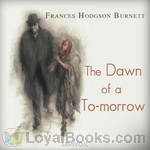 The Dawn of a To-morrow
The Dawn of a To-morrow
A wealthy London business man takes a room in a poor part of the city. He is depressed and has decided to take his life by going the next day to purchase a hand gun he had seen in a pawnshop window. The morning comes with one of those 'memorable fogs' and the adventure he has in it alters his decisions and ultimately his life. | |
By: Frances Ridley Havergal (1836-1879) | |
|---|---|
 Coming to the King
Coming to the King
A collection of poems by Frances Ridley Havergal and others, all describing different aspects of our walk with God, from 'Coming to the King' to 'Under the Shadow.' | |
By: Francis Aidan Gasquet (1846-1929) | |
|---|---|
 Breaking with the Past Catholic Principles Abandoned at the Reformation
Breaking with the Past Catholic Principles Abandoned at the Reformation
| |
By: Francis Bacon (1561-1626) | |
|---|---|
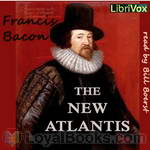 The New Atlantis
The New Atlantis
In 1623, Francis Bacon expressed his aspirations and ideas in New Atlantis. Released in 1627, this was his creation of an ideal land where people were kind, knowledgeable, and civic-minded. Part of this new land was his perfect college, a vision for our modern research universities. Islands he had visited may have served as models for his ideas. | |
By: Francis Clement Kelley (1870-1948) | |
|---|---|
 Charred Wood
Charred Wood
| |
By: Francis Greenwood Peabody (1847-1936) | |
|---|---|
 Mornings in the College Chapel Short Addresses to Young Men on Personal Religion
Mornings in the College Chapel Short Addresses to Young Men on Personal Religion
| |
By: Francis Hindes Groome (1851-1902) | |
|---|---|
 Two Suffolk Friends
Two Suffolk Friends
| |
By: Francis John McConnell (1871-1953) | |
|---|---|
 Understanding the Scriptures
Understanding the Scriptures
| |
By: Frank Nelson Palmer | |
|---|---|
 A Bird's-Eye View of the Bible Second Edition
A Bird's-Eye View of the Bible Second Edition
| |
By: Frank W. Boreham (1871-1959) | |
|---|---|
 Handful of Stars
Handful of Stars
This is the second of a five volume series called "Texts That Made History". As with the first volume, "A Bunch of Everlastings", each chapter tell a brief biography with emphasis on the text from scripture that was significant in the life of each. It is biography and Bible study expertly woven together to produce interesting and inspirational stories. | |
 Rubble and Roseleaves, and Things of That Kind
Rubble and Roseleaves, and Things of That Kind
Frank Boreham was a well known preacher who served in England, Australia, and New Zealand. He published dozens of books and thousands of editorials during his lifetime, with no sign of slowing down, even up until his death at age 88. He wrote with a distinctive style, seeming to be able to draw a spiritual lesson out of any conceivable topic.In this volume, Boreham characterizes each chapter as neither sermons nor essays, but simply, as he calls them, "outbursts" or "wayward notions," and he presents them to us as if we were all gathered around a comfortable fire together. - Summary by Devorah Allen | |
 Faces in the Fire, and Other Fancies
Faces in the Fire, and Other Fancies
In this collection of essays, Frank Boreham shares with us his musings on how everyday items such as boots and linoleum, or a cozy fire, or even Nothing at all, can enrich our spiritual lives and draw us closer to our Heavenly Father. Summary by Devorah Allen. | |
By: Franz Valery Marie Cumont (1868-1947) | |
|---|---|
 The Oriental Religions in Roman Paganism
The Oriental Religions in Roman Paganism
| |
By: Frederic W. Farrar (1831-1903) | |
|---|---|
 Seekers after God
Seekers after God
| |
By: Frederick Brückbauer (1864-) | |
|---|---|
 The Kirk on Rutgers Farm
The Kirk on Rutgers Farm
| |
By: Frederick Charles Jennings (1847-1948) | |
|---|---|
 Old Groans and New Songs Being Meditations on the Book of Ecclesiastes
Old Groans and New Songs Being Meditations on the Book of Ecclesiastes
| |
By: Frederick Temple (1821-1902) | |
|---|---|
 The Relations Between Religion and Science Eight Lectures Preached Before the University of Oxford in the Year 1884
The Relations Between Religion and Science Eight Lectures Preached Before the University of Oxford in the Year 1884
| |
By: Frederick William Robertson (1816-1853) | |
|---|---|
 Sermons Preached at Brighton Third Series
Sermons Preached at Brighton Third Series
| |
By: Friedrich Nietzsche (1844-1900) | |
|---|---|
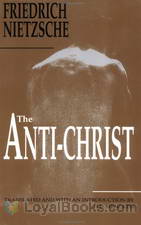 The Antichrist
The Antichrist
Save for his raucous, rhapsodical autobiography, Ecce Homo, The Antichrist is the last thing that Nietzsche ever wrote, and so it may be accepted as a statement of some of his most salient ideas in their final form. Of all Nietzsche’s books, The Antichrist comes nearest to conventionality in form. It presents a connected argument with very few interludes, and has a beginning, a middle and an end. | |
By: G. H. (George Henry) Gerberding (1847-1927) | |
|---|---|
 The Way of Salvation in the Lutheran Church
The Way of Salvation in the Lutheran Church
| |
By: G. K. Chesterton (1874-1936) | |
|---|---|
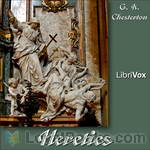 Heretics
Heretics
The Author Gilbert Keith Chesterton was born in London, England on the 29th of May, 1874. Though he considered himself a mere “rollicking journalist,” he was actually a prolific and gifted writer in virtually every area of literature. A man of strong opinions and enormously talented at defending them, his exuberant personality nevertheless allowed him to maintain warm friendships with people–such as George Bernard Shaw and H. G. Wells–with whom he vehemently disagreed. Chesterton had no difficulty standing up for what he believed... | |
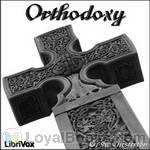 Orthodoxy
Orthodoxy
Orthodoxy is a book that has become a classic of Christian apologetics. In the book's preface Chesterton states the purpose is to "attempt an explanation, not of whether the Christian faith can be believed, but of how he personally has come to believe it." In it, Chesterton presents an original view of the Christian religion. He sees it as the answer to natural human needs, the "answer to a riddle" in his own words, and not simply as an arbitrary truth received from somewhere outside the boundaries of human experience. | |
 The New Jerusalem
The New Jerusalem
“On the road to Cairo one may see twenty groups exactly like that of the Holy Family in the pictures of the Flight into Egypt; with only one difference. The man is riding on the ass.” “The real mistake of the Muslims is something much more modern in its application than any particular passing persecution of Christians as such. It lay in the very fact that they did think they had a simpler and saner sort of Christianity, as do many modern Christians. They thought it could be made universal merely by being made uninteresting... | |
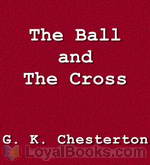 The Ball and the Cross
The Ball and the Cross
The Ball and the Cross is G. K. Chesterton's third novel. In the introduction Martin Gardner notes that it is a "mixture of fantasy, farce and theology." Gardner continues: "Evan MacIan is a tall, dark-haired, blue-eyed Scottish Highlander and a devout Roman Catholic.... James Turnbull is a short, red-haired, gray-eyed Scottish Lowlander and a devout but naive atheist.... The two meet when MacIan smashes the window of the street office where Turnbull publishes an atheist journal. This act of rage occurs when MacIan sees posted on the shop's window a sheet that blasphemes the Virgin Mary, presumably implying she was an adulteress who gave birth to an illegitimate Jesus... | |
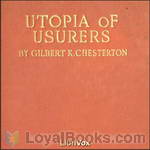 A Utopia of Usurers
A Utopia of Usurers
“Now I have said again and again (and I shall continue to say again and again on all the most inappropriate occasions) that we must hit Capitalism, and hit it hard, for the plain and definite reason that it is growing stronger. Most of the excuses which serve the capitalists as masks are, of course, the excuses of hypocrites. They lie when they claim philanthropy; they no more feel any particular love of men than Albu felt an affection for Chinamen. They lie when they say they have reached their position through their own organising ability... | |
By: G. MacLaren (George MacLaren) Brydon (1875-1963) | |
|---|---|
 Religious Life of Virginia in the Seventeenth Century The Faith of Our Fathers
Religious Life of Virginia in the Seventeenth Century The Faith of Our Fathers
| |
By: Gaius Glenn Atkins (1868-1956) | |
|---|---|
 Modern Religious Cults and Movements
Modern Religious Cults and Movements
| |
By: George A. (George Augustus) Cobbold (1857-) | |
|---|---|
 Religion in Japan
Religion in Japan
| |
By: George Adam Smith (1856-1942) | |
|---|---|
 Jeremiah : Being The Baird Lecture for 1922
Jeremiah : Being The Baird Lecture for 1922
| |
By: George Alfred Henty (1832-1902) | |
|---|---|
 A Jacobite Exile Being the Adventures of a Young Englishman in the Service of Charles the Twelfth of Sweden
A Jacobite Exile Being the Adventures of a Young Englishman in the Service of Charles the Twelfth of Sweden
| |
By: George Barton (1866-1940) | |
|---|---|
 Angels of the Battlefield
Angels of the Battlefield
"Angels of the Battlefield: A History of the Labors of the Catholic Sisterhoods in the Late Civil War" chronicles the compassionate services of these dedicated women during the bitter and bloody U.S. Civil War. These accounts also offer some important historical details, giving some important insights into the people and events of the war. This is the Second Edition, Revised and Enlarged. - Summary by Larry Wilson | |
By: George Berkeley (1685-1783) | |
|---|---|
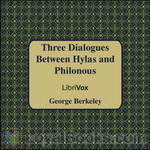 Three Dialogues Between Hylas and Philonous
Three Dialogues Between Hylas and Philonous
Berkeley uses Hylas as his primary contemporary philosophical adversary, John Locke. A Hylas is featured in Greek mythology and the name Hylas is derived from an ancient Greek word for “matter” which Hylas argues for in the dialogues. Philonous translates as “lover of mind.” In The First Dialogue, Hylas expresses his disdain for skepticism, adding that he has heard Philonous to have “maintained the most extravagant opinion… namely, that there is no such thing as material substance in the world.” Philonous argues that it is actually Hylas who is the skeptic and that he can prove it. Thus, a philosophical battle of wit begins. | |
By: George Frederick Kunz (1856-1932) | |
|---|---|
 Curious Lore of Precious Stones
Curious Lore of Precious Stones
Full title is "The Curious Lore of Precious Stones, being a description of their sentiments and folklore, superstitions, symbolism, mysticism, use in medicine, protection, prevention, religion, and divination, crystal gazing, birthstones, lucky stones, and talismans, astral, zodiacal, and planetary." Just about everything you ever wanted to know about precious stones, aside from their formation, acquisition, and chemical composition. - Summary by TriciaG | |
By: George Frederick Maclear (1833-1902) | |
|---|---|
 Class-Book of Old Testament History
Class-Book of Old Testament History
This is classic book by scholar, educator, theologian and preacher George Frederick Maclear, headmaster of King's College School, London, and later warden of St. Augustine's Missionary College, Canterbury. Each short chapter is a nugget of events and persons of the Old Testament, giving a very accessible overview of history from the Earliest Times to those of Ezra and Nehemiah. | |
By: George Gillespie (1613-1648) | |
|---|---|
 The Works of Mr. George Gillespie (Vol. 1 of 2)
The Works of Mr. George Gillespie (Vol. 1 of 2)
| |
By: George Henry Borrow (1803-1881) | |
|---|---|
 Letters of George Borrow to the British and Foreign Bible Society
Letters of George Borrow to the British and Foreign Bible Society
| |
By: George Henry Sumner (1824-1909) | |
|---|---|
 Churchwardens' Manual their duties, powers, rights, and privilages
Churchwardens' Manual their duties, powers, rights, and privilages
| |
By: George Herbert Betts (1868-1934) | |
|---|---|
 How to Teach Religion Principles and Methods
How to Teach Religion Principles and Methods
| |
By: George John Romanes (1848-1894) | |
|---|---|
 A Candid Examination of Theism
A Candid Examination of Theism
| |
 Thoughts on Religion
Thoughts on Religion
| |
By: George Ludington Weed (1828-1904) | |
|---|---|
 A Life of St. John for the Young
A Life of St. John for the Young
| |
By: George MacDonald | |
|---|---|
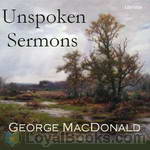 Unspoken Sermons
Unspoken Sermons
George MacDonald was a Scottish author, poet, and Christian minister. In his day he was considered one of the great Victorian authors on par with Dickens, Thackeray, Kipling and the like. His reputation as an author, however, has not fared as well largely because of the ubiquitous and fervent presence of religion throughout his works.MacDonald's theology, though sprinkled liberally throughout his fairly substantial number of books, is perhaps nowhere more palpable than in Unspoken Sermons. These sermons, though by no means amongst the most popular of MacDonald's work, have had theological impact from their first appearance... | |
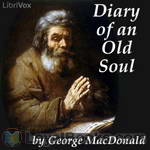 Diary of an Old Soul
Diary of an Old Soul
George MacDonald, a Scottish pastor, wrote these short poems, one for each day of the year, to help him with the severer misfortune he was experiencing. The poems are filled with hope and promises of Christ, yet, he also writes about his doubts. These poems are wonderful to listen to for people of any religion. | |
 Alec Forbes of Howglen
Alec Forbes of Howglen
| |
 Miracles of Our Lord
Miracles of Our Lord
Actions, it is often said, speak louder than words. But in the life of Christ - as George MacDonald shows - both spoke with an equal volume. Much attention is often devoted to what Jesus said while He was on earth, but many in our modern age are puzzled by the miracles. What are we to make of them? MacDonald - wise and gentle as ever - invites us into the miracles as a doorway into the inner life of Christ that we may intimately know Him and His Father. | |
 England's Antiphon
England's Antiphon
"In this book I have sought to trace the course of our religious poetry from an early period of our literary history. ... [I]f its poetry be the cream of a people's thought, some true indications of the history of its religious feeling must be found in its religious verse, and I hope I have not altogether failed in setting forth these indications. My chief aim, however, will show itself to have been the mediating towards an intelligent and cordial sympathy betwixt my readers and the writers from whom I have quoted. In this I have some confidence of success. Heartily do I throw this my small pebble at the head of the great Sabbath-breaker Schism." - From the Preface | |
By: George Manville Fenn (1831-1909) | |
|---|---|
 Quicksilver The Boy With No Skid To His Wheel
Quicksilver The Boy With No Skid To His Wheel
| |
 Mass' George A Boy's Adventures in the Old Savannah
Mass' George A Boy's Adventures in the Old Savannah
| |
By: George Müller (1805-1898) | |
|---|---|
 Answers to Prayer, from George Müller's Narratives
Answers to Prayer, from George Müller's Narratives
Mr. Brooks, in this compilation, has endeavored to select those incidents and practical remarks from Mr. Müller's Narratives, that show in an unmistakeable way, both to believers and unbelievers, the secret of believing prayer, the manifest hand of a living God, and His unfailing response, in His own time and way, to every petition which is according to His will. (From the Preface) | |
By: George Sale (1697-1736) | |
|---|---|
 The Koran (Al-Qur'an)
The Koran (Al-Qur'an)
| |
By: George Smith (1833-1919) | |
|---|---|
 Life of William Carey
Life of William Carey
| |
By: George Spring Merriam (1843-1914) | |
|---|---|
 The Chief End of Man
The Chief End of Man
| |
By: George Thomas Daly (1872-1956) | |
|---|---|
 Catholic Problems in Western Canada
Catholic Problems in Western Canada
| |
By: George Tybout Purves (1852-1901) | |
|---|---|
 Joy in Service; Forgetting, and Pressing Onward; Until the Day Dawn
Joy in Service; Forgetting, and Pressing Onward; Until the Day Dawn
| |
By: George Tyrrell (1861-1909) | |
|---|---|
 The Faith of the Millions (2nd series)
The Faith of the Millions (2nd series)
| |
By: George W. Foote (1850-1915) | |
|---|---|
 Comic Bible Sketches Reprinted from "The Freethinker"
Comic Bible Sketches Reprinted from "The Freethinker"
| |